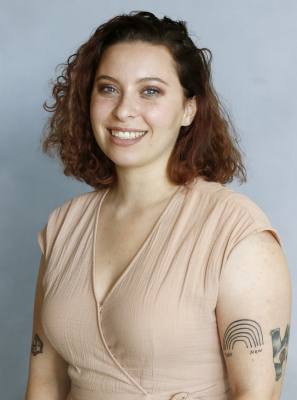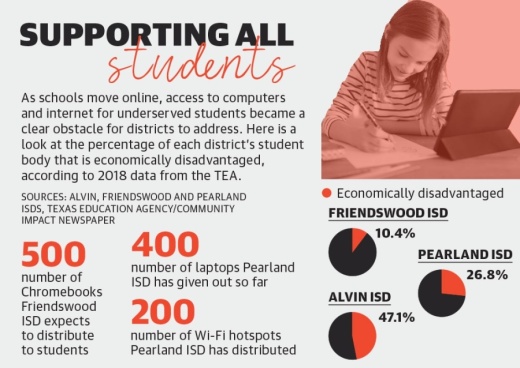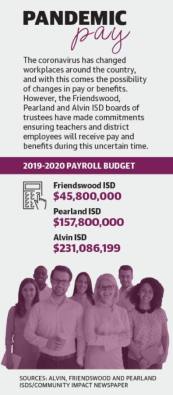School districts across the country have had to rapidly adapt due to the spread of the new coronavirus around the world. From canceled state testing to moving all classes online, every aspect of the school year has been affected. But Pearland, Friendswood and Alvin ISDs have each found a way to still support their students and staff during this time of uncertainty, district officials said.
On March 16, Gov. Greg Abbott waived State of Texas Assessments of Academic Readiness requirements for districts in Texas, with the Texas Education Agency canceling all standardized testing in the state shortly after. On April 17, he announced that schools will remain closed through the rest of the 2019-20 school year. As a result of school closing, districts transferred to online learning and teaching in March.
FISD Superintendent Thad Roher spoke at a board of trustees special meeting about the work district employees had done for the online transition.
“If I would have in May stopped during convocation and told everyone I’d like for you to be ready in August to go completely online, we never would have thought it was enough time,” Roher said. “This team has done it in a week, and I’d like to say how grateful I am about how they’ve stepped up.”
The online classroom
All three districts closed schools for the week of March 16 and made the pivot to remote instruction. By March 23, each district had launched its first week of online learning.“School districts have been in constant communication with the commissioner of education to make sure we’re being responsive to the needs of our students and communities,” AISD Associate Superintendent Daniel Combs said. “No. 1 is the health and well-being of students and staff but also making sure during this time of interruption we’re maintaining instructional continuity.”
The largest change for students has been the complete shift to online classes with remote teaching, PISD Executive Director of Communications Kim Hocott said.
Hocott said while the district would obviously prefer to not be in this situation, it is going to look at the circumstances as an opportunity.
“Everything we’re doing is a chance to learn new tools for teaching that we may use going into the future,” Hocott said.
Assignments have been adjusted for the needs of each grade. In Pearland and Friendswood, high school students were already using an online tool called Canvas, so the transition to online learning was a bit more intuitive, Hocott said. For younger grades there are different learning applications for students, parents and teachers to use.
Diane Myers, FISD’s assistant superintendent of secondary curriculum and instruction, said teachers called each of their students during the time before classes started again and offered advice and support for parents while maintaining their bonds with the students. With the calls, teachers ensured children and families had the tools they needed to successfully transition to virtual classes.
PISD and AISD teachers also reached out to their students to check on their well-being and establish which students needed help accessing the internet or a computer.
Underserved students
Before online learning began, Pearland and Friendswood ISDs began lending laptops and hot spots to students without access.According to 2018 data from the TEA, 10.4% of FISD’s student body is economically disadvantaged. In PISD, that portion of the student body is 26.8%, and for AISD it is 47.1%. All three districts acknowledged the importance of putting systems in place to help these students succeed.
At the FISD board meeting, Executive Director of Technology Tonia Meadows said she is expecting to give out over 500 Chromebooks to students without computers. PISD has given around 400 laptops and almost 200 hot spots to students thus far, Hocott said.
Both districts have said they expect more students to request access to a computer or hot spot because as classes begin in earnest, many students will realize what they have at home will not suffice.
For AISD students, Director of Communications Renae Rives said the district will provide packets students can pick up from different campuses twice a week.
“We are putting together enough to last through being closed until April 10, and then we will reassess,” Rives said. “Everything is changing quickly, so we’re constantly thinking about what we need to do to be prepared.”
Lauren Ambeau, FISD’s executive director of elementary teaching and learning, emphasized the importance of recognizing the difficulties teachers may face now that many are home with their own children and balancing that with a full-time teaching job.
“Our priority when moving to remote was balancing the needs of all our stakeholders into something reasonable and realistic,” Ambeau said. “We really want to listen to the feedback that is going to come in now that we have some true assignments and instruction.”
Support for teachers
Natalie Clogston, the PISD Education Foundation’s chief foundation officer, said she hopes one positive aspect of the situation is a renewed appreciation for the value teachers bring to a community.“With everything going on with virtual classrooms and homeschooling, we hope that people see how critical education is to the community and the importance of supporting our amazing teachers,” Clogston said.
The PISD Education Foundation typically holds a fundraising gala every March to fundraise for the innovative teaching grants the organization gives to teachers in the district. The innovative teaching grants reward teachers and ideas that go above and beyond the curriculum but are not able to be funded by the regular budget.
The money raised at the gala, which is the largest fundraiser of the year, often determines the amount of grants the organization is able to give. To date, this gala has raised around $600,000. This year’s gala has been indefinitely postponed.
“Right now, we would have been collecting applications from teachers, hearing all their ideas, choosing which grants to approve, but now everything is on hold,” Clogston said. “What better time than now for the community to support the work our teachers are doing?”
Hocott said thus far PISD has received positive feedback from parents about the support and communication teachers are offering them. She added she was proud of the district, students, teachers and parents for how they have adjusted to the requirements of the time.
Combs echoed that sentiment when he spoke about the ways in which he had seen teachers confront the challenges of education during the pandemic head on.
“It is so encouraging and uplifting in this time, seeing the way educators are metaphorically wrapping their arms around their students, trying to provide a sense of normalcy.” Combs said. “It shows the critical role that teachers play in the lives of their students and the broader community.”







